

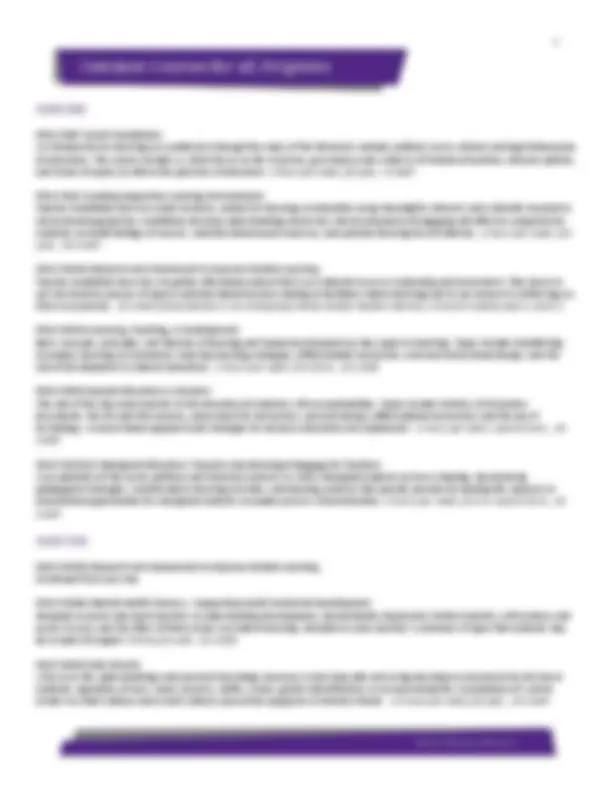
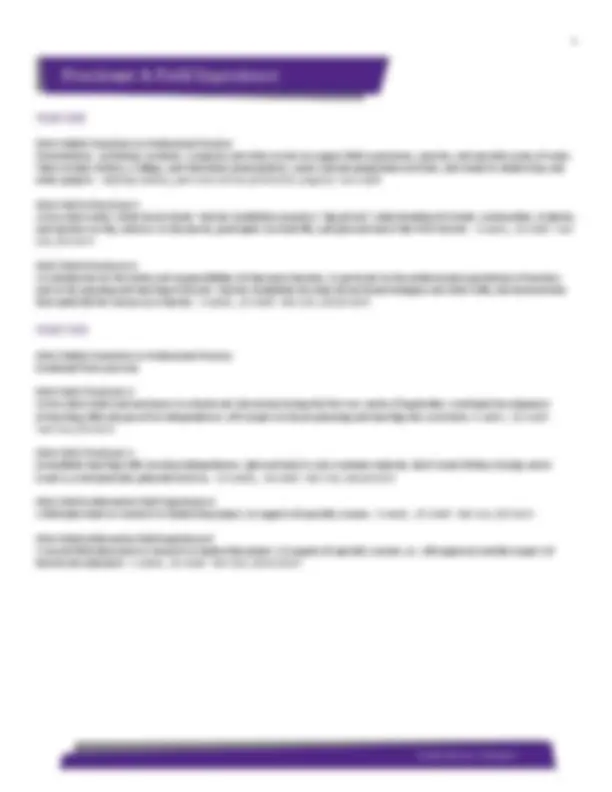
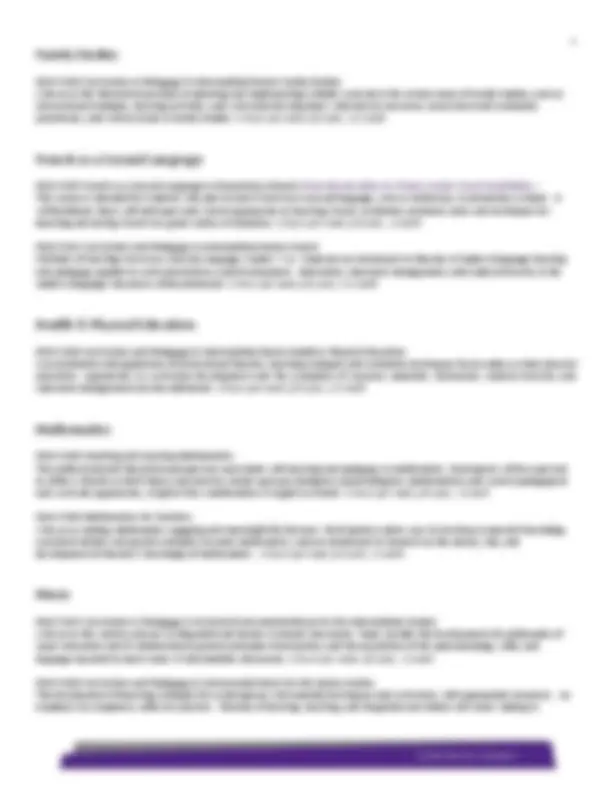
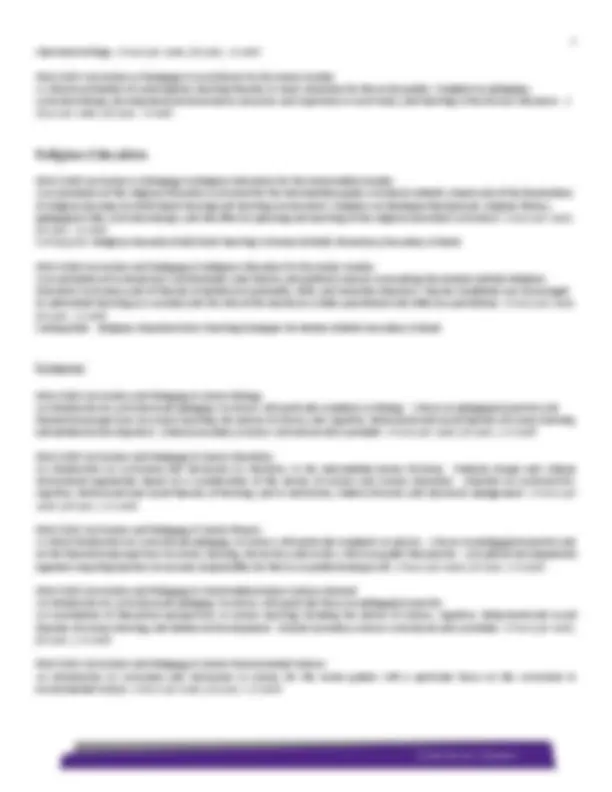
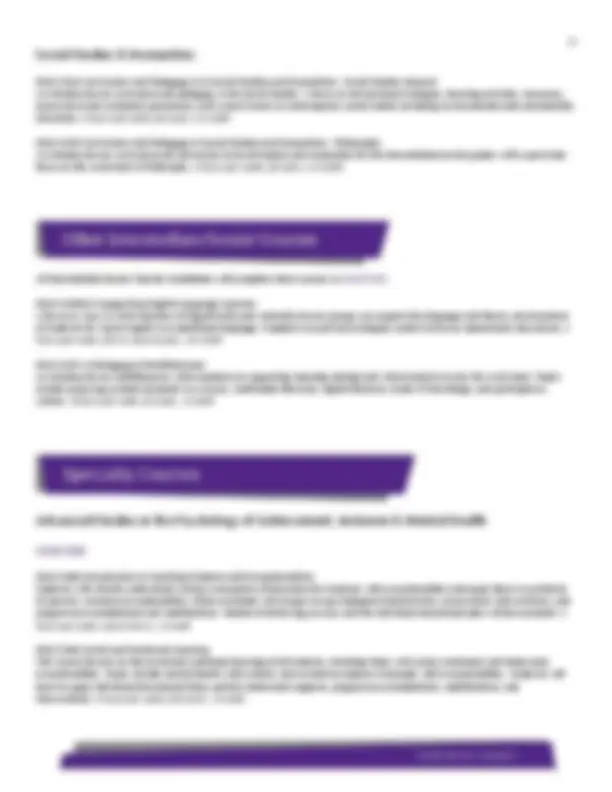
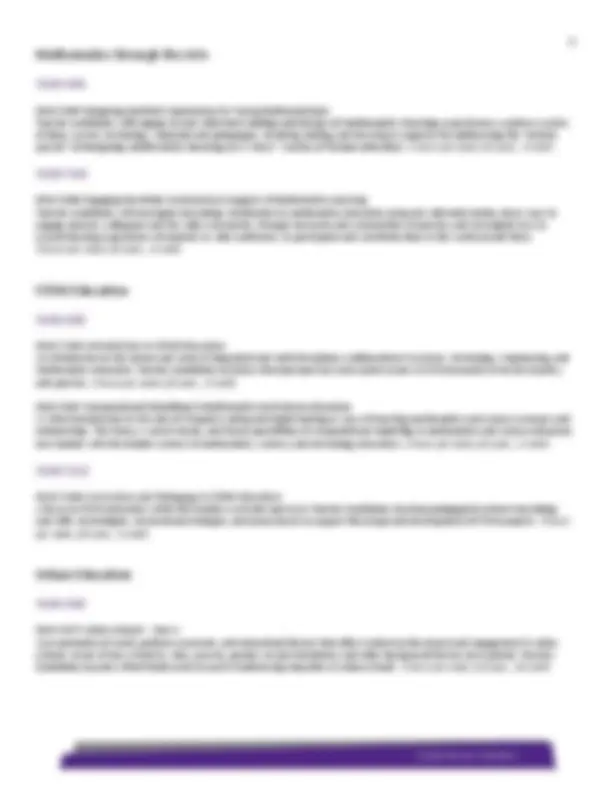
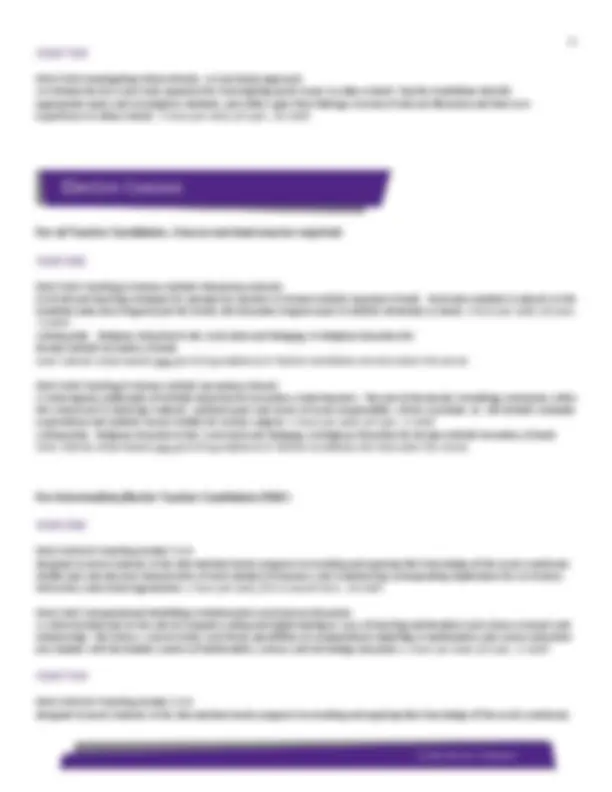
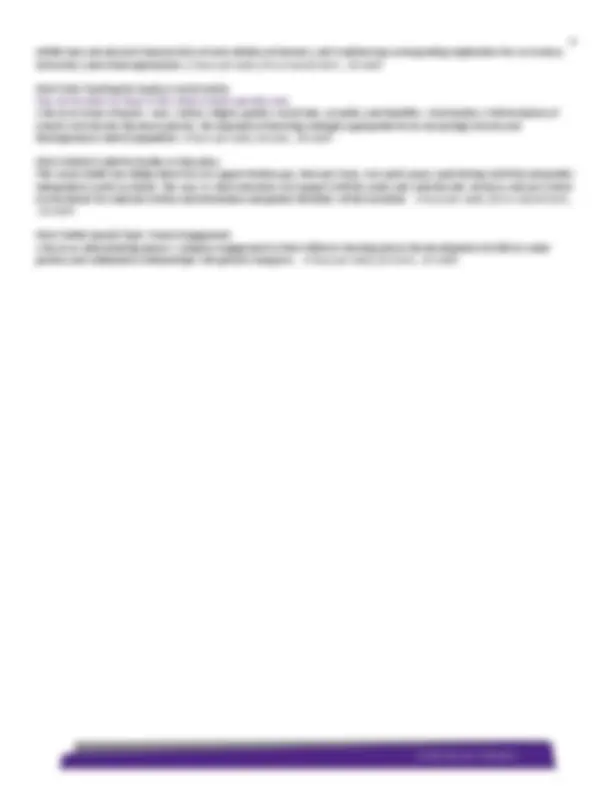


Study with the several resources on Docsity

Earn points by helping other students or get them with a premium plan


Prepare for your exams
Study with the several resources on Docsity

Earn points to download
Earn points by helping other students or get them with a premium plan
Community
Ask the community for help and clear up your study doubts
Discover the best universities in your country according to Docsity users
Free resources
Download our free guides on studying techniques, anxiety management strategies, and thesis advice from Docsity tutors
A detailed description of the courses offered in the Bachelor of Education program for the academic year 2022-2023. It includes common courses for all programs, practicum and field experiences, primary/junior and junior/intermediate curriculum courses, junior/intermediate and intermediate/senior curriculum courses, specialty courses, and elective courses. The document also provides information on the duration, credit, and content of each course.
Typology: Exercises
1 / 15

This page cannot be seen from the preview
Don't miss anything!










Common Courses for All Programs YEAR ONE EDUC 500 7 Social Foundations An introduction to teaching as a profession through the study of the historical, colonial, political, socio-cultural, and legal dimensions of education. The course includes a critical focus on the structure, governance and contexts of Ontario education, relevant policies, and issues of equity to inform the practices of educators. 2 hours per week, full year,. 5 credit EDUC 5012 Creating Supportive Learning Environments Teacher Candidates learn to create inclusive, productive learning communities using meaningful, relevant, and culturally responsive instructional approaches. Candidates develop understandings about how the development of engaging and effective programs for students can build feelings of success, minimize behavioural concerns, and optimize learning for all students. 2 hours per week, full year, .50 credit EDUC 5013Q Research and Assessment to Improve Student Learning Teacher Candidates learn how to gather information about their own students to serve in planning and assessment. They learn to use the iterative process of inquiry and data-based decision making to facilitate student learning and to use research in reflecting on their own practice. .25 credit (Couse delivery is via small groups led by Master Teacher Mentors; 2 hours bi-weekly years 1 and 2.) EDUC 5 01 5Q Learning, Teaching, & Development Basic concepts, principles, and theories of learning and human development as they apply to teaching. Topics include establishing exemplary learning environments, selecting teaching strategies, differentiated instruction, universal instructional design, and the role of development in student transitions. 2 hours per week, first term, .25 credit EDUC 5016S Special Education & Inclusion The role of the classroom teacher in the education of students with exceptionalities. Topics include Ministry of Education documents, the IEP and IPRC process, assessment for instruction, universal design, differentiated instruction, and the use of technology. An asset-based approach and strategies for inclusive education are emphasized. 2 hours per week, second term,. credit EDUC 5423Q/S Aboriginal Education: Toward a Decolonizing Pedagogy for Teachers An exploration of the social, political, and historical contexts in which Aboriginal students receive schooling. Decolonizing pedagogical strategies, transformative learning activities, and learning contexts that provide promise for healing the ruptures in educational opportunities for Aboriginal students in Canada receive critical attention. 2 hours per week, first or second term,. credit YEAR TWO EDUC 5013Q Research and Assessment to Improve Student Learning Continued from year one. EDUC 5018Q Mental Health Literacy – Supporting Social-Emotional Development Designed to assist classroom teachers in understanding development, mental health, depression, family dynamics, self-esteem, and access to care, and the effect of these issues on student learning. Intended to raise teachers’ awareness of signs that students may be in need of support. Online, full year .25 credit EDUC 5019S Safe Schools A focus on the understandings and practical knowledge necessary to develop safe and caring learning environments for all school students, regardless of race, creed, ancestry, ability, colour, gender identification, or sexual orientation. Examination of current trends in school violence and school violence prevention programs in Ontario schools_. 1.5 hours per week, full year, .25 credit_
Practicum & Field Experiences for All Programs YEAR ONE EDUC 5008Q Transition to Professional Practice Presentations, workshops, seminars, symposia, and other events to support field experiences, practica, and specialty areas of study. These include Ministry, College, and Federation presentations, career and job preparation activities, and research, leadership, and other projects. Half days weekly, years one and two of the B.Ed. program, non-credit EDUC 5021Q Practicum 1 Active observation within local schools. Teacher Candidates acquire a “big picture” understanding of schools, communities, students, and teachers as they observe in classrooms, participate in school life, and plan and teach their first lessons. 4 weeks, .25 credit. Year one, first term EDUC 5022S Practicum 2 An introduction to the duties and responsibilities of classroom teachers, in particular to the professional expectations of teachers and to the planning and teaching of lessons. Teacher Candidates develop instructional strategies and other skills, and demonstrate their potential for success as a teacher. 4 weeks, .25 credit. Year one, second term YEAR TWO EDUC 5008Q Transition to Professional Practice Continued from year one. EDUC 502 3 Practicum 3 Active observation and assistance in schools and classrooms during the first two weeks of September. Continued development of teaching skills and growth in independence with respect to lesson planning and teaching the curriculum. 6 weeks, .50 credit. Year two, first term EDUC 5024 Practicum 4 Consolidate teaching skills, develop independence, plan and teach a unit, evaluate students, teach some full days during weeks 5 and 6, or demonstrate potential to do so. 5 - 6 weeks, .50 credit. Year two, second term EDUC 5025Q Alternative Field Experience A A field placement or research or leadership project, in support of specialty courses. 3 weeks, .25 credit. Year two, first term EDUC 5026S Alternative Field Experience B A second field placement or research or leadership project, in support of specialty courses, or, with approval, another aspect of teacher development. 4 weeks, .25 credit. Year two, second term
assessment and instructional strategies for use in intervention and classroom contexts. 3 hours per week, first or second term,. credit EDUC 5439Q/S Supporting English Language Learners A focus on ways in which teachers of linguistically and culturally diverse groups can support the language and literacy development of students for whom English is an additional language. Emphasis on practical strategies useful in diverse mainstream classrooms. 3 hours per week, first or second term, .25 credit Junior/Intermediate & Intermediate/Senior Curriculum Courses (Teaching Subjects) Junior/Intermediate and Intermediate/Senior teacher candidates will complete the teaching subject course(s) for which they were admitted. All Teaching Subject courses are taken in YEAR ONE. Canadian and World Studies EDUC 5212 Curriculum and Pedagogy in Canadian & World Studies - Geography A focus on curriculum and approaches to the teaching and learning of geography. Resources, assessment and evaluation procedures, and current issues in geography and social science education, including the use of geotechnologies and the place of environmental and sustainability education, are discussed. 4 hours per week, full year, 1.0 credit EDUC 5213 Curriculum and Pedagogy in in Canadian & World Studies - History A critical examination of curriculum and instruction in history at the intermediate-senior level. A focus on approaches to teaching and learning, resources, assessment and evaluation, and on current issues and developments in history and social science education. 4 hours per week, full year, 1.0 credit EDUC 5240 Curriculum and Pedagogy in Canadian and World Studies - Economics An introduction to curriculum and instruction in Canadian and World Studies for the senior grades with a particular focus on the curriculum in Economics. 4 hours per week, full year, 1.0 credit EDUC 5242 Curriculum and Pedagogy in Canadian and World Studies - Law An introduction to curriculum and instruction in Canadian and World Studies for the intermediate/senior grades with a particular focus on the curriculum in Law. 4 hours per week, full year, 1.0 credit EDUC 5244 Curriculum and Pedagogy in Canadian and World Studies – Political Science An introduction to curriculum and instruction in Canadian and World Studies for the senior grades with a particular focus on the curriculum in Political Science. 4 hours per week, full year, 1.0 credit English EDUC 5208 Curriculum and Pedagogy in Intermediate/Senior English An introduction to the historical and contemporary theories and practices of teaching English/Language Arts, Grades 7-12. Literature, literary theory, cultural/media studies, the sociology and psychology of literacy(ies) and language development, as well as curriculum design, implementation and assessment are included. 4 hours per week, full year, 1.0 credit
Family Studies EDUC 5210 Curriculum & Pedagogy in Intermediate/Senior Family Studies A focus on the theoretical premises of planning and implementing suitable curricula in the various areas of Family Studies, and on instructional strategies, learning activities, and curriculum development. Attention to resources, assessment and evaluation procedures, and current issues in Family Studies. 4 hours per week, full year, 1.0 credit French as a Second Language EDUC 5107 French as a Second Language in Elementary Schools (Must also be taken by Primary/Junior French Candidates.) This course is intended for students who plan to teach French as a second language, core or immersion, in elementary schools. It will familiarize them with both past and current approaches to teaching French, textbooks commonly used, and techniques for teaching and testing French in a great variety of situations. 2 hours per week, full year, .5 credit EDUC 5211 Curriculum and Pedagogy in Intermediate/Senior French Methods of teaching French as a Second Language, Grades 7-12. Students are introduced to theories of modern language learning and pedagogy applied to curriculum delivery and development. Motivation, classroom management, and student diversity in the modern language classroom will be addressed. 4 hours per week, full year, 1.0 credit Health & Physical Education EDUC 5220 Curriculum and Pedagogy in Intermediate/Senior Health & Physical Education An examination and application of instructional theories, teaching strategies and evaluation techniques for secondary school physical education. Approaches to curriculum development and the evaluation of resource materials. Motivation, student diversity and classroom management are also addressed. 4 hours per week, full year, 1.0 credit Mathematics EDUC 5136 Teaching and Learning Mathematics The professional and theoretical perspectives associated with learning and pedagogy in mathematics. Participants will be expected to reflect critically on both theory and practice, based upon psychological, epistemological, mathematical, and current pedagogical and curricular approaches, in light of how mathematics is taught in schools. 2 hours per week, full year, .5 credit EDUC 5236 Mathematics for Teachers A focus on making mathematics engaging and meaningful for learners. Participants explore ways to develop connected knowledge, consistent beliefs, and positive attitudes towards mathematics, and are introduced to research on the nature, role, and development of teachers' knowledge of mathematics. 2 hours per week, full year, .5 credit Music EDUC 5137 Curriculum & Pedagogy in Vocal and Instrumental Music for the Intermediate Grades A focus on the creative process in integrated and learner-centered classrooms. Topics include the development of a philosophy of music education and its relationship to general principles of education, and the acquisition of the understandings, skills, and language required to teach music in intermediate classrooms. 2 hours per week, full year, .5 credit EDUC 5239 Curriculum and Pedagogy in Instrumental Music for the Senior Grades The development of teaching strategies for contemporary instrumental techniques and curriculum, with appropriate resources. An emphasis on competent, reflective practice. Theories of learning, teaching, and integration are linked with music-making in
Social Studies & Humanities EDUC 5214 Curriculum and Pedagogy in in Social Studies and Humanities - Social Studies General An introduction to curriculum and pedagogy in the Social Studies. A focus on instructional strategies, learning activities, resources, assessment and evaluation procedures, and current issues in contemporary social studies including environmental and sustainability education. 4 hours per week, full year, 1.0 credit EDUC 5243 Curriculum and Pedagogy in Social Studies and Humanities - Philosophy An introduction to curriculum and instruction in Social Studies and Humanities for the intermediate/senior grades with a particular focus on the curriculum in Philosophy. 4 hours per week, full year, 1.0 credit Other Intermediate/Senior Courses All Intermediate/Senior Teacher Candidates will complete these courses in YEAR TWO: EDUC 5439Q/S Supporting English Language Learners A focus on ways in which teachers of linguistically and culturally diverse groups can support the language and literacy development of students for whom English is an additional language. Emphasis on practical strategies useful in diverse mainstream classrooms. 3 hours per week, first or second year, .25 credit EDUC 54 57 A Pedagogy of Multiliteracies An introduction to multiliteracies with emphasis on supporting meaning making and critical analysis across the curriculum. Topics include assessing semiotic demands in a course, multimodal literacies, digital literacies, funds of knowledge, and participatory culture. 3 hours per week, full year, .5 credit Specialty Courses Advanced Studies in the Psychology of Achievement, Inclusion & Mental Health YEAR ONE EDUC 5480 Introduction to Teaching Students with Exceptionalities Students will critically understand various conceptions of education for students with exceptionalities and apply these to problems of practice. Common exceptionalities will be examined with respect to psychological characteristics, assessment, interventions, and program accommodations and modifications. Models of delivering services and the individual educational plan will be examined. 4 hours per week, second term, .5 credit EDUC 5481 Social and Emotional Learning This course focuses on the social and emotional learning of all students, including those with social, emotional, and behavioral exceptionalities. Topics include mental health, safe schools, and societal acceptance of people with exceptionalities. Students will learn to apply Individual Educational Plans, positive behavioral supports, program accommodations, modifications, and interventions. 4 hours per week, first term, .5 credit
YEAR TWO EDUC 5482 Academic Learning for Students with Exceptionalities Students will learn to analyze and address problems of practice concerning the academic learning of students with exceptionalities. Topics include general practices such as strategy instruction, universal design, and differentiated instruction; and subject-specific practices in decoding, reading comprehension, written composition, mathematics, and content area subjects_. 3 hours per week, full year, .5 credit_ Early Childhood Education YEAR ONE EDUC 5460 Curriculum, Pedagogy, and Learning in Early Childhood Part 1 Introduction and critical analysis of historical and contemporary theories of children and early childhood curricula (e.g., developmental and reconceptualist) and current debates and advances in the field (e.g., children’s rights and issues of equity and social justice). Implications for implementing Ontario curricula to foster strong teacher/child, school/family, and interprofessional relationships. 2 hours per week, full year, .5 credit YEAR TWO EDUC 5461 Curriculum, Pedagogy, and Learning in Early Childhood Part 2 Critical analysis of diverse approaches to early childhood curriculum and of implications for curricular commonplaces in the Ontario context. A complement to core curricular instruction with emphasis on advanced curriculum development, implementation, and assessment to enhance children’s meaning making_. 3 hours per week, full year, .5 credit_ French - Elementary YEAR ONE EDUC 5107 French as a Second Language in Elementary Schools This course is intended for students who plan to teach French as a second language, core or immersion, in elementary schools. It will familiarize them with both past and current approaches to teaching French, textbooks commonly used, and techniques for teaching and testing French in a great variety of situations. 2 hours per week, full year, .5 credit YEAR TWO EDUC 5414Q Teaching French Immersion This course is designed to develop an awareness of the variety of programs that exist in Canada and of the instructional strategies needed to teach in such programs. Emphasis will be placed on the development of language in a French Immersion program through an integrated approach_. 3 hours per week, first term, .25 credit_ EDUC 5464S The Common European Framework of Reference (CEFR) for Primary/Junior An introduction to pedagogical approaches associated with the Common European Framework of Reference for Languages/CEFR (Council of Europe, 2001), including the three - dimensional character of its global proficiency scales (communicative activities, language quality, and strategies), and its emphasis on continuously linking teaching and assessment. 3 hours per week, second term, .25 credit
Mathematics through the Arts YEAR ONE EDUC 5485 Designing Aesthetic Experiences for Young Mathematicians Teacher candidates will engage in arts-informed making and design of mathematics learning experiences; explore a variety of ideas, events, technology, materials and pedagogies, including making; and develop a capacity for addressing the “artistic puzzle” of designing mathematics learning as a “story” worthy of human attention. 2 hours per week, full year, .5 credit YEAR TWO EDUC 5486 Engaging the Wider Community in Support of Mathematics Learning Teacher candidates will investigate knowledge mobilization in mathematics education using arts-informed modes; learn ways to engage parents, colleagues and the wider community, through networks and communities of practice; and investigate how to extend learning experiences of students to wider audiences, to participate and contribute ideas in the world around them. 3 hours per week, full year, .5 credit STEM Education YEAR ONE EDUC 5465 Introduction to STEM Education An introduction to the nature and value of integrated and multi-disciplinary collaborations in Science, Technology, Engineering, and Mathematics education. Teacher Candidates develop critical perspectives and explore issues in STEM education in terms of policy and practice. 2 hours per week, full year, .5 credit EDUC 5467 Computational Modelling in Mathematics and Science Education A critical introduction to the role of computer coding and digital making as ways of teaching mathematics and science concepts and relationships. The history, current trends, and future possibilities of computational modelling in mathematics and science education are situated with the broader context of mathematics, science, and technology education. 2 hours per week, full year, .5 credit YEAR TWO EDUC 5466 Curriculum and Pedagogy in STEM Education A focus on STEM education within the broader curricular spectrum. Teacher Candidates develop pedagogical content knowledge, and skills, technologies, instructional strategies, and assessments to support the design and development of STEM projects. 3 hours per week, full year, .5 credit Urban Education YEAR ONE EDUC 547 7 Urban Schools – Year 1 An examination of social, political, economic, and educational factors that affect student achievement and engagement in urban schools. Issues of race, ethnicity, class, poverty, gender, sexual orientation, and other background factors are explored. Teacher Candidates acquire critical frameworks to assist in addressing inequities in urban schools. 2 hours per week, full year, .50 credit
YEAR TWO EDUC 5476 Investigating Urban Schools: A Case Study Approach An introduction to a case study approach for investigating equity issues in urban schools. Teacher Candidates identify appropriate topics and investigative methods, and reflect upon their findings in terms of relevant literature and their own experiences in urban schools. 3 hours per week, full year, .50 credit Elective Courses For all Teacher Candidates. Course overload may be required: YEAR ONE EDUC 5445 Teaching in Roman Catholic Elementary Schools Curricula and teaching strategies for prospective teachers in Roman Catholic Separate Schools. Particular emphasis is placed on the Canadian Catechism Program and the Family Life Education Program used in Catholic elementary schools. 2 hours per week, full year, .5 credit Antirequisite: Religious Education 5 138 , Curriculum and Pedagogy in Religious Education for Roman Catholic Secondary Schools Note: Catholic school boards may give hiring preference to Teacher Candidates who have taken this course. EDUC 5446 Teaching in Roman Catholic Secondary Schools A contemporary philosophy of Catholic education for secondary school teachers. The role of the teacher in building community within the school and in fostering students’ spiritual quest and sense of social responsibility will be examined, as will Catholic Graduate expectations and Catholic Course Profiles for various subjects. 2 hours per week, full year, .5 credit Antirequisite: Religious Education 5238 , Curriculum and Pedagogy in Religious Education for Roman Catholic Secondary Schools Note: Catholic school boards may give hiring preference to Teacher Candidates who have taken this course. For Intermediate/Senior Teacher Candidates ONLY: YEAR ONE EDUC 5425Q/S Teaching Grades 7 & 8 Designed to assist students in the Intermediate/Senior program in extending and applying their knowledge of the social, emotional, intellectual, and physical characteristics of early adolescent learners, and in addressing corresponding implications for curriculum, instruction, and school organization. 2 hours per week, first or second term, .25 credit EDUC 5467 Computational Modelling in Mathematics and Science Education A critical introduction to the role of computer coding and digital making as ways of teaching mathematics and science concepts and relationships. The history, current trends, and future possibilities of computational modelling in mathematics and science education are situated with the broader context of mathematics, science, and technology education. 2 hours per week, full year, .5 credit YEAR TWO EDUC 5425Q/S Teaching Grades 7 & 8 Designed to assist students in the Intermediate/Senior program in extending and applying their knowledge of the social, emotional,